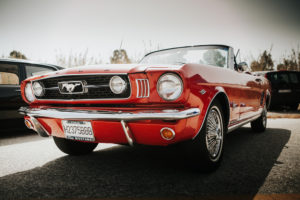A Classic Car Leads to a Classic Unfair and Deceptive Trade Practices Claim
Is a 1966 Mustang a “classic car?” Was that the vintage that Steve McQueen drove in Bullitt? (No.) Can you get special insurance for such a vehicle? And if you do, will your insurer pay if the car is involved in an accident? And what if your insurer says that you have “classic car coverage” but refuses to pay the agreed-upon value when you make a claim? Is that an unfair and deceptive trade practice?
These are just a few questions raised in a recent North Carolina Court of Appeals opinion, White v. Allstate Insurance Co. So, let’s strap on our seat belts, get in our DeLorean, and take a journey back, if not all the way to 1955, at least to 2007 when the plaintiff, Michael White, restored his Mustang and reached out to his insurance agent about special coverage for it. On the way, we have stops scheduled with an untimely notice of appeal, an untimely affidavit, the language of a general release, and the statute of limitations before we arrive at our typical destination—section 75-1.1.
 They Install that TruCoat at the Factory.
They Install that TruCoat at the Factory.
Prior to the restoration, Mr. White had a standard auto policy. In 2007, he restored the car, possibly by adding the TruCoat to prevent oxidation. He reached out to his Allstate agent, Tony Sheets, about obtaining “classic car insurance.” After an inspection and appraisal, Mr. Sheets told Mr. White that he would change his coverage so that, in the event of a collision, the policy would pay the full value of the car, which they agreed was $24,000. In exchange for this increase in coverage, Mr. White’s premiums increased significantly.
There’s Two Ways You Can Go on this Job, My Way or the Highway.
In 2015, Mr. White’s car was damaged in a collision with a City of Raleigh garbage collection truck. He notified his insurer, and Allstate appraised the damage. To Mr. White’s surprise, Allstate offered to pay only $5,297, which it claimed was the post-collision actual cash value of the car. No word on whether Allstate was facing a visit from Mr. Blonde or Mr. Pink at that point.
What Waters? Casablanca Is in the Desert.
Unhappy with this offer, Mr. White met with Wynne Dunn, who had purchased the insurance agency from Mr. Sheets in 2011. Like Humphrey Bogart and water in Casablanca, Mr. Dunn told Mr. White that he had been misinformed. Allstate did not even offer classic car coverage, and Mr. White had been paying premiums far higher than he should have been. Allstate continued to reject his claim and refused to pay the full $24,000. Litigation ensued.
The Notice of Appeal was Late for a Very Important Date.
The trial court eventually granted summary judgment in defendants’ favor on December 17, 2019. But, like the White Rabbit, our Mr. White did not file his notice of appeal until February 18, 2020—over two months later. The Court of Appeals noted that under Appellate Rule 27(c), it generally lacks jurisdiction to hear an appeal when the notice of appeal is untimely. However, the parties stipulated that Mr. White was never served with the judgment in the trial court. Since the Court of Appeals has discretion to treat an appeal as a petition for certiorari in appropriate circumstances, and Rule 21(a)(1) gives appellate courts the authority to review the merits of an untimely appeal by certiorari, it reached the merits of the case.
Weekend at Bernie’s
The notice of appeal wasn’t the only late filing in the case, though. Moving back to the Rules of Civil Procedure, Rule 56(c) requires affidavits to be served at least two days before a summary-judgment hearing. Mr. White filed an affidavit on Friday, December 13, 2019, for a hearing on Monday, December 16, 2019. This might appear like two days earlier, but Civil Rule 6(a) excludes weekends when the period of time at issue is less than seven days.
The trial court admitted the untimely affidavit anyway. That decision is reviewed for abuse of discretion, and the Court of Appeals concluded that it was not an abuse because the affidavit did not include new information, nor did the defendant seek a continuance or argue that they were prejudiced by its admission.
Because Getting There Is Half the Fun
Continuing on our route to Walley World, defendants next argued that Mr. White’s claim was barred because he settled a claim against the City of Raleigh for the damages caused by its garbage truck. But the release that Mr. White signed for that settlement did not name Allstate or the other defendants in this case. It did release claims against all other persons “who may be jointly or severally liable” with the City. The Court of Appeals looked at that language and concluded that defendants were not joint tortfeasors with the City.
What We’ve Got Here Is a Failure to Communicate.
Defendants next argued that Mr. White’s claims were time-barred because he should have discovered, with reasonable diligence, that he did not have classic car coverage when he purchased the policy in 2008. Mr. White argued that he did not learn this until his meeting with Mr. Dunn in August 2015 after the accident. The Court of Appeals found that there was sufficient dispute about the evidence on this point to submit the issue to a jury.
Unfair and Deceptive Trade Practices
Finally, the case enters the narrow trench with the exhaust port at the end. If you navigated this far before turning off your targeting computer, you probably know how it will turn out. Using familiar language, the Court of Appeals noted that Mr. White “need only show that an act or practice had the tendency or capacity to mislead or created the likelihood of deception.”
The evidence in the record was sufficient to create an issue of fact on this question as well. After all, Mr. White said that he told his insurance agent that he wanted classic car coverage. He said that he agreed with the agent on the value of the car: $24,000. His policy was changed. The premiums were increased by 315% for collision coverage and 490% for comprehensive coverage.
In addition, after the accident, Mr. Dunn told Mr. White that he had been overcharged for years. The Court of Appeals noted that systematic overcharging itself can constitute an unfair and deceptive trade practice. Indeed, on several previous occasions, we have covered this issue on this blog.
And with that, the Court of Appeals reversed and remanded the case for trial. Hardly the stuff that dreams are made of, but Mr. White will surely be hoping that the jury shows him the money when the case arrives back in Wake County Superior Court.
Author: Jamie Weiss


